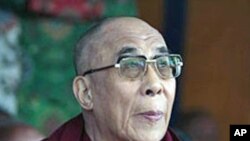The Dalai Lama is standing by his decision to step down from his role as political leader of the Tibetan exile movement, rejecting a parliamentary request that he stay on.
Following two days of debate, the resolution was passed by a majority of 37 to 1, with five members being on leaves of absence. It asked the Dalai Lama to continue to be both the temporal and spiritual leader of the Tibetan people, saying his leadership was pre-eminently democratic and there was no better alternative to it.
However, in his address to the Tibetan public at the Tsuglakhang ground, Friday the Dalai Lama reiterated what he had stated in his letter to the parliament on Mar 14, explaining his decision to retire completely as political leader and asking it to carry out the necessary constitutional and other sweeping amendments to effectuate it.
The Dalai Lama reconfirmed the plan he announced recently: to pass political authority over to a prime minister elected by Tibetan exiles, while retaining his role as spiritual leader of the Tibetan Buddhist movement. He said he wanted to focus more on his spiritual role, following the examples of the first to the fourth Dalai Lama who did not rule Tibet.
The 76-year-old Nobel Prize laureate first announced his decision March 10, the anniversary of the 1959 failed uprising against Chinese rule that sent him into exile in India.
Tibetans will begin voting Sunday for a new prime minister, in a previously scheduled election. Three candidates are on the ballot, and about 85,000 Tibetans - most in India but also residents of several other countries - are eligible to vote.
Some information for this report was provided by Tibetan Review





